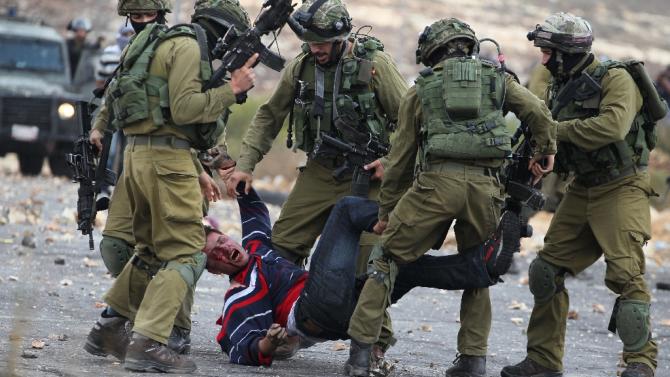New Unrest Rocks the Powder Keg That is Israel and the West Bank
New unrest hits Israel, West Bank despite calls for calm

October 8, 2015
AFP - New violence rocked Israel and the West Bank on Wednesday, with three stabbings and an Arab shot dead by police, as Prime Minister Benjamin Netanyahu warned Israelis to be on maximum alert against "terrorism."
In the West Bank, meanwhile, men thought to be undercover Israeli police opened fire on a group of Palestinian stone-throwers they had infiltrated, wounding three of them.
Israeli and Palestinian officials reportedly met for security talks in the West Bank Tuesday evening, and there were calls Wednesday from the European Union for calm and a return to political dialogue.
In the meantime, however, Netanyahu had a stark message for his citizens.
"Israeli civilians are at the forefront of a war againstNetanyahu, who postponed a visit to Germany to tackle violence that has raged for three weeks, added:terrorism and must also be on maximum alert," he said Wednesday after visiting a Jerusalem police headquarters.
"The goal of terrorism is to spread fear, and the way to defeat it is to maintain composure and resilience on both a national and personal level," his office quoted him as saying.
"We have known worse times than this, and we will overcome this new wave of terror by maintaining our determination, responsibility and unity."President Reuven Rivlin has warned that Israel and the Palestinians are "sitting on a volcano".
In a potential sign of efforts to ease tensions, however, a report in the Haaretz daily said Netanyahu had ordered police to bar ministers and lawmakers from visiting the Al-Aqsa mosque compound in Jerusalem.
Blocking Israeli politicians from the compound would be aimed at lowering tensions and reducing the level of Palestinian violence. It is the third-holiest site in Islam and the most sacred in Judaism.
Muslims fear Israel will seek to change rules governing the site, which allow Jews to visit but not pray to avoid provoking tensions.
Israel had already lifted age restrictions from Wednesday on Muslims praying at the compounds.
'Sitting on a Volcano'
Both sides were the targets of violence, amid fears of a new Palestinian intifada, or uprising, despite efforts to calm tensions.
In central Israel's Kiryat Gat, police shot dead an Arab man after he allegedly wounded a soldier with a knife and took his weapon, authorities said.
In Jerusalem's Old City, not far from Al-Aqsa, police said an 18-year-old Palestinian woman stabbed a 35-year-old Jewish man in the back and lightly wounded him.
The man, who was armed, managed to draw his gun, shooting and seriously wounding his attacker, police said.
Rivlin warned against using the incident to incite further violence, saying "those who wish to turn the tragedy between us, Palestinians and Israel... into a religious war have blood on their hands."
In another incident, four masked men who had been among Palestinians throwing stones in the West Bank suddenly turned on them, drew pistols and began firing.
One of three shot was seriously wounded in the back of the head.
Palestinians regularly accuse Israel of placing Arabic-speaking infiltrators among demonstrators.
Jewish settlers shot and seriously wounded an 18-year-old Palestinian near the West Bank town of Bethlehem, the Red Crescent and witnesses said.
In the same area, a group of Palestinians tried to seize a Jewish woman from her car and possibly kidnap her, Israeli military spokesman Arye Shalicar said.
Settlers fired in the air and the woman managed to escape, Shalicar said.
And a Jewish man was attacked with a knife outside a shopping centre in Petah Tikva, near Tel Aviv, police said, adding that the attacker had been overpowered.
Moves to Avoid Escalation
The spike in violence has brought international calls for calm, with concerns the unrest could spin out of control and escalate into a new intifada like those of 1987-93 and the early 2000s.
In Brussels, EU foreign policy chief Federica Mogherini said it was vital for Netanyahu and Abbas to "show leadership to promote calm, encourage restraint and avoid actions which further fuel tensions."
"The Israeli as well as the Palestinian people have the right to live in security," she said.
"The way to tackle the violence and unrest is for both sides to move quickly to restart a credible political process.... Ultimately, a negotiated two state solution is the only way to bring the lasting peace and security that both Israelis and Palestinians deserve."
Israeli ministers barred from Jerusalem site; man stabbed
October 8, 2015AP - A Palestinian stabbed a Jewish seminary student in Jerusalem on Thursday as the Israeli prime minister barred all Cabinet ministers and lawmakers from visiting a sensitive holy site in the Old City in an effort to calm tensions that have gripped the country for weeks.
"One of the advantages Israel has is that there are many veterans of military units with operational combat experience," he said. "Having a weapon increases the resident's confidence."



No comments:
Post a Comment